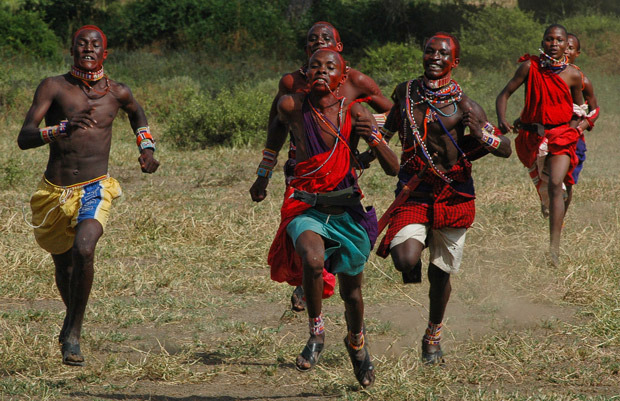
The first ever Maasai Olympics took place just before Christmas near Kenya's Amboseli National Park in Kenya. It was a really great conservation and anti-poaching initiative that didn't get a ton of attention outside of the safari industry.
It is a long held cultural tradition among the Maasai and other pastoral groups in Kenya that young warriors want to prove their manhood by hunting and killing a lion. The idea for the Olympics was born when the Maasailand Preservation Trust (MPT) approached Maasai cultural leaders (the menye layiok-fathers of the warriors) in search of innovative ways to discourage lion hunting.
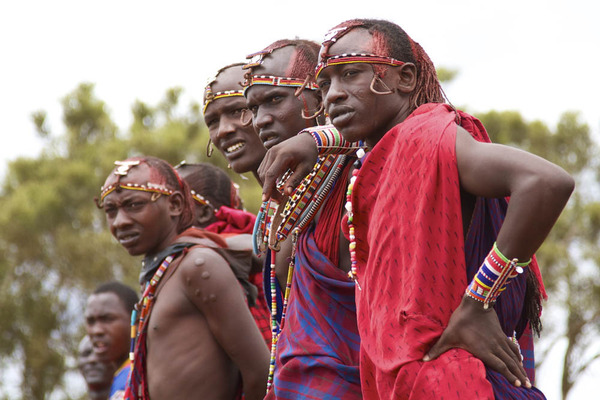
The resulting Maasai Olympics brought together a hundred young Maasai athletes recently initiated as morani (warriors) in the Amboseli-Tsavo ecosystem. The finalists, representatives from four manyattas (warrior villages) competed in track and field events in a unique effort to replace the traditional lion hunt with competitive sports. Instead of hunting for lions the athletes competed to bring honor to their manyattas and age-groups and demonstrate their individual skills and athletic prowess.
The Olympics consisted of five events: a 200m sprint, 5km run, javelin and more traditional events including rungu throwing and high jumping. In the rungu throwing event, competitors threw their rungus (a club used as protection from predators) into a sack 20 yards away. The high-jumping competition incorporated a skill for which the Maasai are particularly known. In kind of a reverse limbo, a string was stretched between two wooden poles and raised over seven feet. The high-jumper had to touch the string with the top of his head, which was raised after each round. The winner of the event, Kisian Lemoyian hit 8.8 feet!
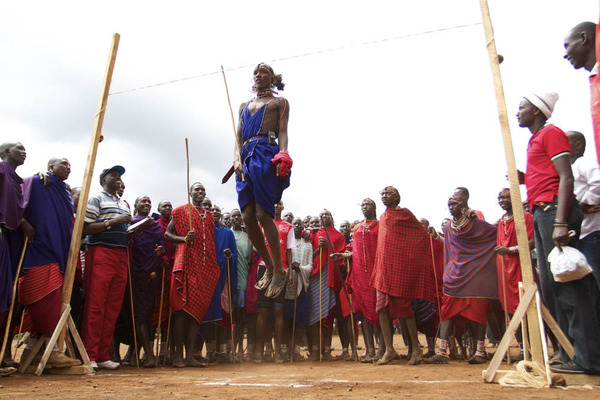
The High Jump
Warrior athletes from Mbirikani Group Ranch were the overall winners, receiving a grand prize of a stud Borana bull, (a real prize in a pastoral community). The winners of individual events received medals, cash and scholarship money. Jacob Parmuya winner of the 5-K run will have the opportunity to train with 800 meter Olympic Gold Medalist and world record holder David Rudisha and a full sponsorship to compete in the 2013 New York Marathon.
Although more female participation would be an improvement for future years, women did compete in their own 100 meter and 1,500 meter events. The winners will join Ruth Waithera Ng'ang'a, Africa Championships bronze medalist, for professional training at her athletics camp.
To recognize those who exceled at conservation in addition to athletic prowess, the Chester Zoo Wildlife Conservation Prize was awarded to the Rombo Group Ranch for its conservation efforts. Richard Bonham, founder of MPT noted that while the Rombo group earns nothing from tourism (which some of the other groups do in revenue sharing arrangements with properties) there have been no lions killed on Rombo and they have some of the best game scouts.
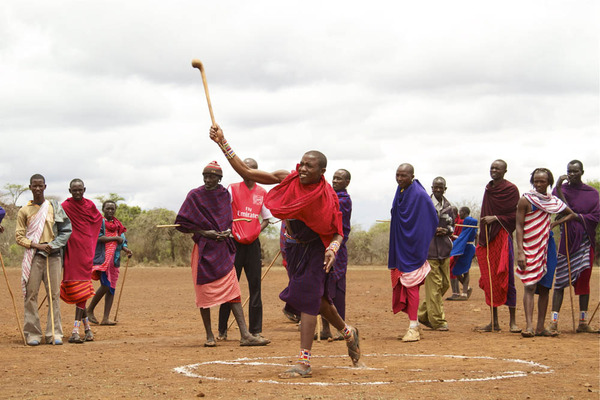
Rungu Throwing
The games were co-hosted by the MPT, Amboseli Trust for Elephants and the Maasai Wilderness Conservation Trust. Additional support came from African Wildlife Foundation, Big Life Foundation and Great Plains Conservation which owns some of our favorite properties in Kenya and Botswana including Ol Donyo Lodge near where the Olympics were held.
Participants and sponsors alike considered the first annual Olympics a success. Tom Hill of the MPT pointed out that "The Maasai Olympics is the first time I am aware of that the Maasai leadership of an entire region has proposed to take lion killing out of their warrior culture." Dereck Joubert, CEO of Great Plains Conservation added that the event was "an once-in-a-lifetime opportunity given by the Maasai elders to save this ecosystem" and the chairman of Rombo Group Ranch noted that "this event...has channeled the youthful energy of our warriors from lion hunting to trophy hunting."
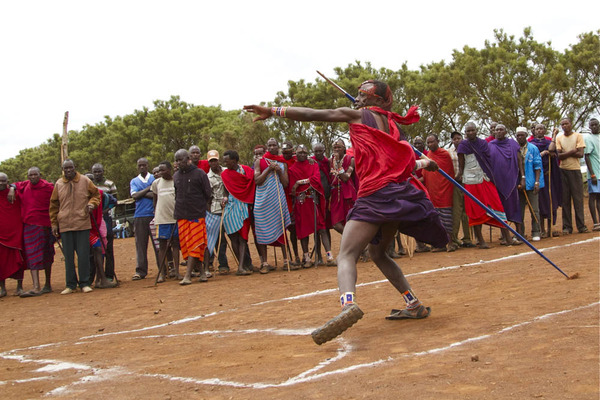
Javelin
One Maasai Olympics does not have the power to eliminate all lion hunting among Maasai communities throughout Kenya and Tanzania. At the same time, similar to cultural programs meant to replace FGM (female genital mutilation), it contributes to a long term process of cultural change. This program is particularly worth writing about because it was designed with lots of input from local leaders. Events like the rungu and high-jump and prizes like breeding bulls, help ensure local support for the event and that it is perceived, within the community, as a legitimate substitution for the lion hunt. In addition, the rounds of competition that took place in the months prior to the finals ensured that there was participation from warrior groups throughout the Amboseli-Tsavo area, beyond those who made the "final four." Finally, the cash and scholarship prizes, the conservation education component of the competition and the prizes handed out to groups that exceled in conservation, all help to draw a clear connection between conservation efforts and financial benefit to these communities. All these factors will hopefully ensure that the Maasai Olympics will continue to have success in years to come.
